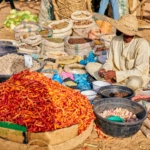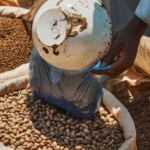
Cashews are no longer just a snack food; they’ve become a global commodity powering economies and creating opportunities across continents. Among the regions making significant strides in this industry is Africa. Once seen primarily as a producer of raw nuts, Africa is now emerging as a central player in global cashew trade. The African cashew export sector is expanding rapidly, bringing with it new challenges and even greater potential.
From West Africa to East Africa, countries are investing heavily in infrastructure, processing capabilities, and market access. Cashew farming is transforming the livelihoods of thousands of smallholder farmers while attracting growing attention from international food companies and investors.
This article explores the rise of African cashew export, the key countries leading the charge, the benefits to local economies, and what the future might hold for this vital agricultural product.
1. Africa’s Rising Role in Global Cashew Supply
Africa is now the largest producer of raw cashew nuts in the world, contributing more than 50% of global production. Countries such as Côte d’Ivoire, Nigeria, Benin, Ghana, and Mozambique dominate the production landscape. However, until recently, much of this produce was exported in raw form to countries like Vietnam and India for processing.
This pattern is beginning to change. The African cashew export market is evolving, with several countries now making concerted efforts to process cashews locally before shipping them abroad. This shift is driven by the need to capture more value from the supply chain, create jobs, and boost local economies.
2. Why Cashews Are in High Demand
Cashews are widely consumed across the world, both as snacks and as ingredients in dairy alternatives, nut butters, and plant-based meals. Health-conscious consumers appreciate them for their high protein content, good fats, and versatile flavor.
As veganism, plant-based eating, and clean-label food trends gain momentum, the demand for cashews continues to rise. African countries, with their vast growing regions and favorable climates, are well-positioned to meet this increasing global appetite.
This is a major reason why African cashew export is seeing strong growth and capturing new markets in Europe, North America, and Asia.
3. Economic Benefits of Cashew Farming in Africa
The cashew industry has become a significant source of income and employment for many African communities. In countries like Côte d’Ivoire and Nigeria, millions of farmers depend on cashew cultivation as their primary source of livelihood.
Export earnings from cashews contribute substantially to national GDPs and foreign exchange reserves. For example, in Côte d’Ivoire, cashew exports are second only to cocoa in terms of agricultural revenue. Local governments are now recognizing the potential of cashew as a tool for rural development and poverty reduction.
By strengthening the African cashew export value chain, countries can empower smallholder farmers, support local processors, and reduce dependence on volatile raw commodity markets.
4. The Push Toward Local Processing
One of the biggest shifts in recent years has been the investment in local cashew processing plants across Africa. Governments and private investors are working to reduce the region’s reliance on exporting raw nuts, which previously meant Africa missed out on significant added value.
By processing cashews domestically, African nations can:
- Create more employment opportunities
- Increase foreign exchange earnings
- Improve product traceability and quality
- Strengthen trade relationships with global buyers
Companies and cooperatives are being trained in sorting, grading, shelling, and packaging techniques to meet international standards. This transformation is critical for the long-term success of African cashew export.
5. Key Export Hubs and Emerging Players
Let’s look at some of the top players in the African cashew export market:
- Côte d’Ivoire: The world’s largest producer of raw cashew nuts, with significant investment in processing and logistics infrastructure.
- Nigeria: Rapidly scaling production and export volumes, with increasing focus on traceability and quality control.
- Benin: A key player in West Africa, Benin is improving its competitiveness by promoting sustainable practices and better post-harvest handling.
- Mozambique and Tanzania: Leading cashew producers in East Africa with a long history of export, now investing in modernizing processing capacity.
These countries are supported by various international development partners and NGOs working to enhance the overall competitiveness of the African cashew sector.
6. Challenges Facing the Sector
Despite the impressive progress, the African cashew export industry still faces several challenges:
- Inadequate Infrastructure: Many processing facilities lack modern machinery and consistent electricity supply.
- Access to Finance: Small and medium enterprises often struggle to obtain capital to scale their operations.
- Global Competition: Countries like Vietnam and India still dominate the processed cashew market due to their established infrastructure.
- Quality Control: Ensuring uniform quality and food safety remains a concern for many new entrants.
To address these challenges, African governments are offering incentives such as tax breaks, capacity-building programs, and access to export financing schemes.
7. Sustainability and Traceability Trends
The modern global food industry is driven by transparency, sustainability, and ethical sourcing. Consumers and retailers want to know the origin of the products they buy. This is leading to a rise in demand for traceable supply chains in the African cashew export industry.
Blockchain tools and mobile apps are helping African exporters track every step of the cashew journey—from farm to shipment. This not only improves accountability but also enhances the product’s value in premium markets.
Sustainability efforts, such as promoting agroforestry, minimizing pesticide use, and ensuring fair labor practices, are also gaining traction across the continent.
Conclusion
The future of African cashew export is undeniably bright. Africa has the land, climate, and skilled workforce to meet the rising global demand for cashews while generating lasting economic value for local communities. With increasing investment in infrastructure, a shift toward local processing, and a growing emphasis on quality and sustainability, African countries are positioning themselves as global leaders in the cashew industry.
Organizations like Ahar Group are playing a vital role in this transformation. By connecting African farmers to international markets, promoting ethical sourcing practices, and maintaining high export standards, Ahar Group exemplifies the kind of leadership needed to drive the industry forward.
Through continued support for innovation, collaboration, and transparent trade, Africa’s cashew sector can deliver not only a premium product to the world but also serve as a catalyst for inclusive and sustainable economic growth.











Add comment